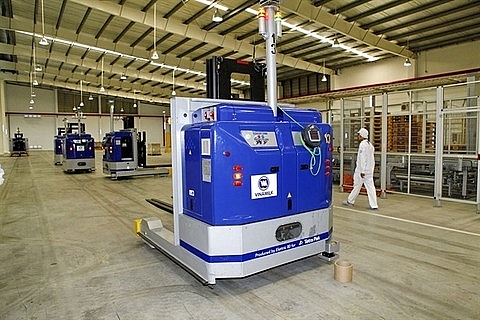Legal corridor needed for digital industry
 |
| A fully-automated production line using robots at a Vinamilk factory. - VNA/VNS Photo |
A report on readiness for the fourth industrial revolution by the World Economic Forum (WEF) revealed that Vietnam ranked 48th in structure of production and 53rd in drivers of production.
Vietnam has made strong technological developments, laying the foundations for the successful application of the technologies of the fourth industrial revolution.
Over the last 10 years, Vietnam’s digital economy has grown in terms of digital connection infrastructure and business market.
The number of internet users in Vietnam was 17.7 million in 2007 and grew to 64 million, equal to 67 per cent of the population, last year. The country ranked 13th among the top 20 countries with the highest number of internet users.
Vietnam is considered to have favourable conditions to fully utilise the achievements of Industry 4.0.
The Vietnam News Agency quoted the head of the Party Central Committee’s Economic Commission Nguyen Van Binh as saying that for a developing country like Vietnam, exploiting the fourth industrial revolution opens up opportunities for Vietnam to raise its technology level, production capacity and competitive capacity in the global value chain; create major changes in the sustainable business model and chances for innovative start-ups and offers the potential for developing countries to shorten industrialisation processes.
Minister of Science and Technology Chu Ngoc Anh stressed that the fourth industrial revolution had had a clear impact on the socio-economic development of Vietnam.
Therefore, the development and promotion of research and development activities and transferring key technologies played an important role in bringing Vietnam closer to the fourth industrial revolution. The country needed to study the development of the fourth industrial revolution and build appropriate policies for socio-economic development in line with international trends, Anh said.
Binh also emphasised that even with proper and timely exploitation of the opportunities of the fourth industrial revolution, the revolution still posed challenges for the country, businesses and individuals.
This required the government and businesses of Vietnam to develop strong innovations, he said.
Also at a high-level forum on Industry 4.0, Prime Minister Nguyen Xuan Phuc emphasised that businesses and people needed to have clear awareness about the fourth industrial revolution, from which they can research, deploy and further apply the achievements of science and technology.
The PM also proposed a response to the negative effects of the fourth industrial revolution, such as setting up scenarios to adapt to the changing circumstances of the revolution; strengthening risk management, and especially dealing with problems of employment and State and corporate governance.
To actively grasp, exploit and respond to challenges of the fourth industrial revolution, Binh affirmed that "the digital industry is the foundation for development".
"Building a strong legal corridor for the digital industry, preparing for the digital transition, developing information infrastructure, training high-quality human resources, reforming administration and enhancing national competitiveness are urgent and necessary," Binh noted.
The Party and State of Vietnam appreciate the development of information technology in the context of the industrial revolution 4.0. The country is studying and developing legal policies to create favourable conditions for enterprises and people to study and apply technology products.
In the context of the fourth industrial revolution around the world, countries and governments are interested in and actively developing their own strategies such as Germany with “Industrie 4.0”, South Korea with “iKorea 4.0’’ and China with “Made in China 2025”.
From the reality and experiences of other countries, Vietnam is also developing its own national strategy.
Prime Minister Nguyen Xuan Phuc asked the Ministry of Planning and Investment to soon complete the development of the National Strategy on Industrial Revolution 4.0, the Ministry of Science and Technology to develop the science and technology and innovation report 2035 and each ministry and locality to develop an action plan in line with the industrial revolution 4.0.
What the stars mean:
★ Poor ★ ★ Promising ★★★ Good ★★★★ Very good ★★★★★ Exceptional
 Tag:
Tag:
Related Contents
Latest News
More News
- Shopee and TikTok Shop account for 8 per cent of Vietnam’s retail market (January 16, 2026 | 00:00)
- Human-centred governance seen as key to AI development (December 19, 2025 | 18:19)
- TECHFEST Vietnam 2025 links startups with policy and capital (December 15, 2025 | 18:21)
- Long Thanh International Airport welcomes first Vietnam Airlines test flight (December 15, 2025 | 18:01)
- Foreign fruits flood Vietnamese market (December 09, 2025 | 13:22)
- Vietnam’s fruit and vegetable exports reach $7.8 billion in first 11 months (December 05, 2025 | 13:50)
- Vietnam shapes next-generation carbon market (November 26, 2025 | 15:33)
- PM urges Ho Chi Minh City to innovate and remain Vietnam’s economic locomotive (November 26, 2025 | 15:29)
- Experts chart Vietnam's digital finance path: high hopes, high stakes (November 14, 2025 | 10:56)
- Vietnam’s seafood imports surge 30 per cent in first 10 months (November 10, 2025 | 19:35)















![[Infographic] AMATA: Industrial and Smart City Developer](https://vir.com.vn/stores/news_dataimages/2026/022026/12/16/croped/amata-industrial-and-smart-city-developer-20260212165823.jpg?260212050401)






 Mobile Version
Mobile Version